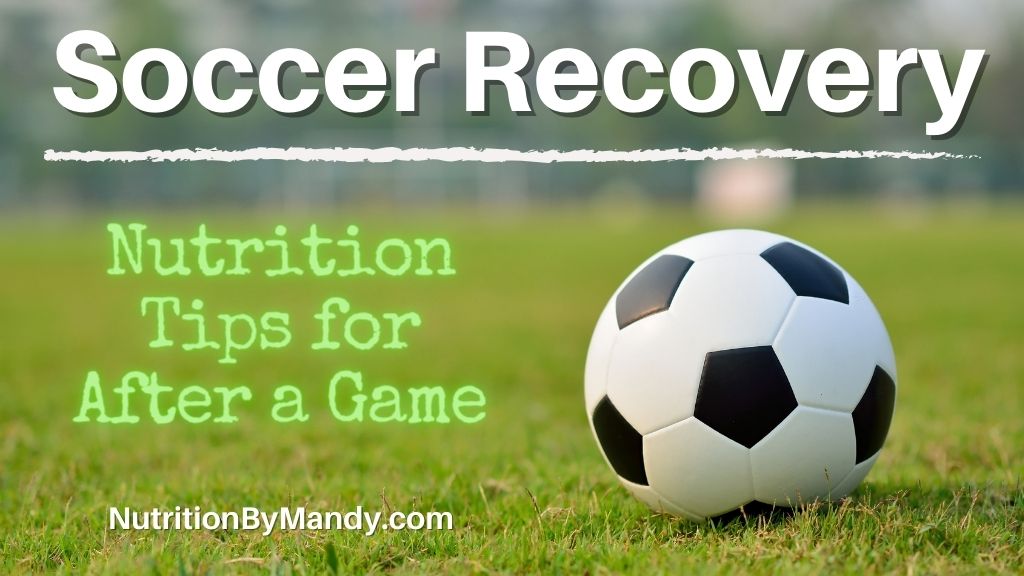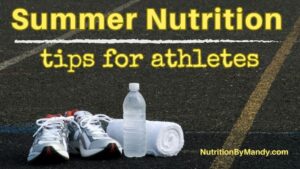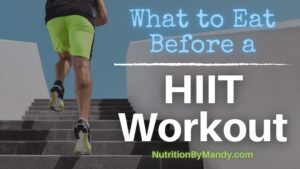Last Updated on January 29, 2025 by Mandy Tyler, M.Ed., RD, CSSD, LD
Soccer Recovery: Nutrition Tips for After a Game
It is important for soccer players to have a sports nutrition plan in place to support their recovery needs between practices and games.
Let’s take a look at soccer recovery nutrition strategies to support athletes with refueling and rehydrating following activity.
When to Prioritize Soccer Recovery Nutrition
Recovery nutrition is particularly important for soccer players when the time between training sessions or soccer matches is limited.
For soccer players, this may include:
- Two-a-day workouts or training sessions
- Back-to-back games
- Tournament competitions
- Athletes participating in both school and club sports with multiple workouts or games within the same day
When soccer players have limited time to fully recover between activities, it is important they focus on nutrition.
By consuming the right foods and drinks, soccer players can support their bodies with recovering and being prepared for the next exercise session.

Three Keys to Soccer Recovery Nutrition
There are three key areas of recovery nutrition that soccer players should focus on, including:
- Rehydrating: Consuming fluid and electrolytes to replace sweat losses
- Refueling: Consuming carbohydrates to replace energy stores
- Repairing: Consuming protein to build and repair muscles
Soccer Recovery: Rehydrate with Fluids and Electrolytes
Hydration should be an important part of a soccer player’s recovery nutrition game plan. During activity, athletes sweat to remove heat from their bodies.
When athletes sweat, they lose both fluid and electrolytes. Therefore, following a soccer game it is important for athletes to rehydrate and replace the fluid and electrolytes lost in sweat.
Weighing before and after activity can help soccer players determine how much fluid they lost in sweat. To replace fluid losses, athletes need to drink more fluid (125%-150% more) than the amount lost in sweat.
For each pound of weight lost during the activity, soccer players should aim to drink 20-24 oz of fluid (1).
When soccer players have limited time between games, replacing this fluid is especially important to ensure they start the next competition in a hydrated state.

Replacing Electrolytes Lost in Sweat
Soccer players also lose electrolytes in their sweat. The main electrolyte lost in sweat is sodium. Thus, consuming food and beverages containing sodium after activity can help with replacing these losses.
In addition, sodium stimulates thirst, which helps encourage soccer players to hydrate. It also helps the body better retain the fluid consumed after exercise (2).
Ideas for foods and drinks containing sodium that soccer players can add to their recovery nutrition snacks and meals include:
- Deli meat, cheese, bread
- Jerky, salted nuts
- Pretzels, pita chips, snack crackers
- Broth-based soup
- Pickles, condiments
- Vegetable juice, tomato sauce
- Sports drinks, electrolyte drinks
Note: If a soccer player has been advised to limit their sodium or fluid intake, the athlete should visit with their doctor or a sports dietitian nutritionist regarding their hydration plan.
Soccer Recovery: Refuel with Carbohydrates
During a soccer game, athletes use their carbohydrate (glycogen) stores to provide their body with energy on the field.
As the game progresses, the body’s stores of carbohydrates become depleted. If the match goes into extended time, glycogen stores are further depleted (3).
Thus, when athletes desire to refuel quickly following a match, it is important to focus on consuming carbohydrates to help replenish these energy stores.
When a quick recovery is needed, it is recommended that soccer players consume 1-1.2 grams of carbohydrate per kilogram body weight for the first 4 hours after activity (1, 4, 5). For a 165-pound athlete, this would be 75 – 90 grams of carbohydrates.

Carbohydrates with Post-Game Meals and Snacks
Athletes can add carbohydrates to their post-game meals and snacks in a variety of ways, including:
- Grains: Bread, bagels, pasta, rice, quinoa, cereal, oatmeal
- Fruit: Fresh, frozen, dried, applesauce, canned in natural juices
- Starchy vegetables: Potatoes, sweet potatoes, corn, peas, beans, and legumes
- Dairy: Milk and yogurt
By combining a variety of high-carb foods in the post-match meals and snacks, soccer players can meet their recovery nutrition needs.
Soccer Recovery: Build and Repair with Protein
In addition to carbohydrates, protein is an important component of a soccer player’s recovery nutrition plan. Consuming protein after activity helps to support the repair and building of lean muscle mass (5).
Following exercise, it is recommended that soccer players aim to consume ~0.25 – 0.3 grams of protein per kilogram of body weight (1, 6).
In general, this calculates to be in the range of 20-40 grams of protein, with larger athletes needing more protein than smaller athletes.
Soccer players can add protein to their recovery meals and snacks in a variety of ways, including:
- Greek yogurt
- High-protein milk, low-fat chocolate milk
- Lean beef, pork, seafood, chicken, turkey, eggs
- String cheese, cheese sticks, sliced cheese, cottage cheese
- Deli meat: Turkey, ham, chicken, roast beef
- Canned tuna or salmon (canned in water)
- Plant-Based: Soy protein, tofu, seitan, nuts, nut butters

Soccer Recovery: Post-Game Snack Ideas
Having easily accessible snacks and recovery drinks available in the locker room can support soccer players with meeting their recovery nutrition needs.
Eating a snack following a soccer match is especially important if it will be several hours until the post-game meal.
Easy post-game soccer snack ideas for the locker room include:
- Low-fat chocolate milk
- Peanut butter and jelly sandwiches, Uncrustables®, Sunbutter® JammiesTM
- Granola bars, fig bars, protein bars
- Beef or turkey jerky
- String cheese, cheese sticks
- Individual containers of Greek yogurt
- Mixed nuts, trail mix
- Nut butter (individual packets work great)
- Turkey and cheese sandwiches or wraps
- Sports drinks, sports bars

Why is Chocolate Milk Recommended for Recovery After Soccer?
Chocolate milk is frequently recommended as a recovery drink that soccer players can enjoy following a match.
Chocolate milk is 90% water, which can help athletes with rehydrating following activity. In addition, a 1-cup serving of chocolate milk provides 8 grams of complete protein and 26 grams of carbohydrates (7).
Chocolate milk is also inexpensive, convenient, and generally well accepted by athletes, thus it can be a convenient post-game option (5).
What About Protein Shakes and Sports Foods to Meet Soccer Recovery Nutrition Needs?
Although soccer players can easily meet their recovery nutrition needs with real food, sometimes protein shakes and other sports foods can be a convenient option.
Some soccer players do not have an appetite post-exercise and find eating a meal to be a challenge. For these athletes, a post-game shake or smoothie may be a solution for meeting carbohydrate and protein needs (4).
Similarly, other sports foods such as protein bars and ready-to-drink beverages, may be a convenient choice when traveling or when a quick option is needed (4).
Sports Supplements for Soccer Players
If a soccer player is considering the use of a protein powder in a shake following a game, it is important to select a high-quality product. Protein powders and other sports supplements are not regulated by the Food and Drug Administration in the same way that food is.
Soccer players need to use caution when considering taking any supplement. Supplements could potentially contain banned substances that are harmful to an athlete’s health or that make the athlete ineligible for competition (8).
A sports dietitian nutritionist for athletes can review dietary supplements and provide guidance on the safety and efficacy of sports supplements.
The sports dietitian can also provide guidance on the best post-match recovery nutrition plan for the athlete.

Soccer Recovery: Post-Game Meal Ideas
When possible, soccer players should aim to follow-up their recovery nutrition snack with a well-balanced meal in the next couple of hours.
Example post-game meals for soccer players include:
- Grilled salmon or chicken, brown rice, steamed broccoli, sliced melon, dinner rolls
- Pasta with marinara sauce, sliced grilled chicken, salad, breadsticks
- Sub sandwich with turkey, ham, or roast beef, baked chips, grapes
- Chicken or beef fajitas, Spanish rice, charro beans, tortillas, pico de gallo, guacamole
If planning a meal for a team, there are numerous restaurants that provide convenient team dinner catering options.
- Chipotle Burrito Bowls – Grilled chicken or steak, rice, black beans, corn salsa, lettuce, tomatoes
- CAVA Bowls – Grilled chicken, brown rice, greens, veggie toppings, hummus, and pita chips
- Jason’s Deli – Pasta bar, baked potato bar, sandwich trays and boxed meals
- Jersey Mike’s – Sub sandwich boxed meals
- Chick-fil-A – Grilled chicken sandwiches and wraps, fresh fruit cups, fruit and yogurt parfaits
- Pei Wei – Individual boxed Asian food meals or shareable platters
Soccer Recovery: Nutrition Tips to Refuel for Your Next Game
You are now set with nutrition tips to support soccer players with recovering between games. As a reminder, athletes should make soccer recovery nutrition a priority when they have limited time to refuel and rehydrate between matches.
For additional sports nutrition tips for soccer players, check out my blog with suggestions for the best breakfast to eat before a soccer game.
Join the Nutrition By Mandy Email List & Get a Free Athlete’s Grocery List
Click HERE to join the Nutrition By Mandy e-mail list. When you join you will receive a free athlete’s grocery list to print and take with you to the store.
About the Author
Mandy Tyler is a Sports Dietitian Nutritionist in the San Antonio, TX area. She is a Registered and Licensed Dietitian, a Board-Certified Specialist in Sports Dietetics, a Licensed Athletic Trainer, and is a Certified Exercise Physiologist through the American College of Sports Medicine. Mandy has experience working with athletes at the high school, collegiate, and professional levels. She believes the key to reaching one’s full potential, both in everyday life and in sports performance, relies on a healthy nutritional foundation.

If you are looking to take your performance to the next level, make sure to check out my new Sports Nutrition Game Day Guide. This downloadable guide is written to help athletes develop an individualized plan to achieve peak performance on game day.






